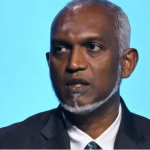Deputy President Rigathi Gachagua is set to confront his accusers on Tuesday during a National Assembly session where an impeachment motion against him will be debated. Kibwezi West MP Mwengi Mutuse, who introduced the motion last Tuesday, has lined up at least three star witnesses, including Nairobi Governor Johnson Sakaja, to testify against the Deputy President.
In addition to Sakaja, the other key witnesses are Secretary to the Cabinet Mercy Wanjau and former acting CEO of Kemsa Andrew Mulwa. These witnesses are expected to provide detailed testimonies to support the grounds upon which Mutuse has based his impeachment motion against Gachagua.
Mutuse has outlined 11 grounds for Gachagua’s removal from office and has attached sworn affidavits from himself and the three witnesses to bolster his case. The first-term MP, elected on the Maendeleo Chap Chap party ticket associated with Labour Cabinet Secretary Alfred Mutua, claims to have built a compelling case against Gachagua.
In his affidavit, Mutuse states he is aware of how the Deputy President allegedly accumulated wealth worth billions over his two years in office. “In the last two years, the DP has inexplicably amassed a huge property portfolio estimated at Sh5.2 billion, mainly through corruption and money laundering,” reads part of his affidavit.
Mutuse argues that Gachagua’s extensive wealth is inconsistent with his known annual salary of Sh12 million.
Mulwa, who was appointed acting CEO of Kemsa in 2023 after a series of corruption scandals, asserts his competence to provide evidence against Gachagua. He alleges that the Deputy President influenced the awarding of a Sh3.7 billion tender for malaria nets. Mulwa claims that on July 11, 2023, Gachagua instructed him to hand over the original bid bond submitted by a company for the tender to his agent.
“As a junior official, there was nothing I could do against a deputy president,” Mulwa states in his affidavit, further accusing Gachagua of harassing and intimidating public officers in violation of Section 34 of the Leadership and Integrity Act.
Wanjau, as the Secretary to the Cabinet and custodian of Cabinet resolutions and policy positions, will also provide evidence in this matter.
“I have knowledge of the issues raised in ground 2 and 10 of the application,” Wanjau states in her sworn affidavit. She accuses Deputy President Gachagua of opposing the Cabinet-approved evacuation of residents living within 30 meters of the Nairobi River, thereby undermining government policy and collective Cabinet responsibility.
Wanjau explains that on April 12, 2024, the Cabinet adopted a policy regarding the Nairobi Rivers Regeneration and Flood Mitigation, which was circulated to relevant Cabinet Secretaries, Principal Secretaries, and government agencies, including the office of the Deputy President, for implementation. She asserts that the resolutions directed the immediate mapping of the Nairobi Rivers corridor and the establishment of a 30-meter statutory riparian boundary, along with a 60-meter planning corridor on both sides of the rivers.
“The mapping was to be conducted by the Ministry of Lands, Public Works and Urban Development, the Nairobi County government, and the Water Resources Authority,” Wanjau’s affidavit states in part. The responsibilities of these three entities included approving the removal of existing structures and buildings along the 30-meter riparian zone within identified flood hotspots, beginning May 2024.
According to Wanjau, this plan included an approved strategy for relocating individuals from danger zones along the Mathare, Nairobi, and Ngong’ Rivers, along with an approved cash transfer program to facilitate alternative accommodation for those affected.
Kibwezi West MP Mwengi Mutuse also mentions in his affidavit that the governor has sworn an affidavit concerning the relocation of Wakulima market traders to Outering Road, a decision Gachagua resisted. The Nairobi County Governor, Johnson Sakaja, cites Article 10(2)(a) of the Constitution, stating that devolution is a fundamental national value and principle of governance.
Sakaja further claims in his affidavit that on September 20, Gachagua “in reckless disregard of the high calling and dignified status of the office of the Deputy President, unlawfully interfered with the running of the county by holding a rally and inciting citizens against lawful directives in the planning and management of the markets.” He alleges that the Deputy President has previously used ethnic incitement to disrupt the county government’s traffic management in Nairobi.
“I believe that Gachagua’s inciting and demeaning public statements and conduct are impeachable offenses. They undermine devolution, the functional and institutional integrity of the county government, and unjustifiably denigrate and ridicule the leadership of county governments,” Sakaja’s affidavit states in part.

